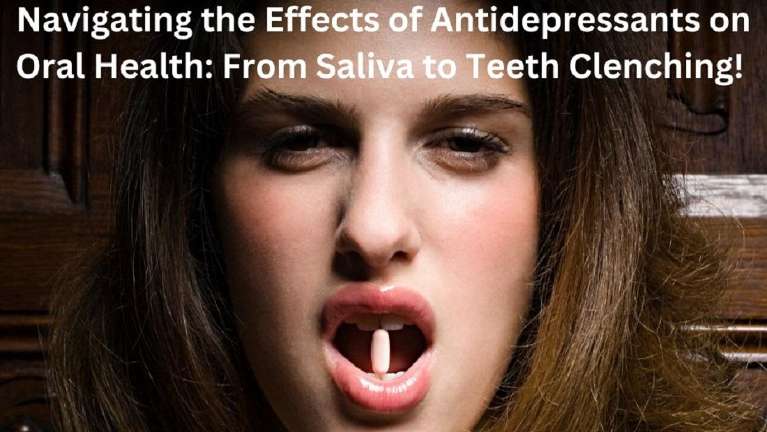
The Complex Connection: SSRIs, Antidepressants, and Their Impact on Oral Health
In the realm of modern medicine, the intricate links between various bodily systems often lead to unexpected discoveries. A particularly fascinating nexus lies at the crossroads of mental health and oral well-being – the effects of SSRIs and antidepressant medications on teeth, saliva production, and the occurrence of clenching and grinding. Let's embark on a journey to explore this connection, backed by credible research and expert insights.
The Role of SSRIs and Antidepressants
Selective Serotonin Reuptake Inhibitors (SSRIs) and other antidepressant medications have revolutionized mental health treatment. Their ability to regulate neurotransmitter levels in the brain is well-documented[^1^]. However, their influence doesn't remain confined to the mind; these medications can have ripple effects throughout the body, including the oral cavity.
Saliva: The Unsung Hero
Saliva, often overshadowed by more glamorous bodily fluids, plays a pivotal role in oral health maintenance. It acts as a natural defense mechanism against bacteria, aids in digestion, and helps neutralize acids that can erode tooth enamel[^2^]. Studies have indicated that certain antidepressants, particularly SSRIs, can lead to a decrease in saliva production, resulting in a condition known as dry mouth (xerostomia)[^3^]. This reduction in saliva flow can elevate the risk of cavities, gum disease, and general oral discomfort.
Clenching and Grinding: The Hidden Consequence
Beyond the realm of saliva, another facet of the antidepressant-oral health connection surfaces – the potential link between these medications and bruxism, the act of clenching or grinding teeth. While research into this connection is ongoing, several studies have suggested a possible correlation between certain antidepressants and an increased propensity for bruxism[^4^][^5^]. The exact mechanisms behind this phenomenon remain to be fully understood.
Navigating the Path to Wellness
Acknowledging these potential effects is just the first step; nurturing both mental and oral wellness in the presence of antidepressants requires a comprehensive approach. Here are some strategies:
1. Hydration: Counteract dry mouth by staying well-hydrated. Sip water regularly, and consider using saliva-stimulating products like sugar-free gum [^6^].
2. Oral Care: Prioritize impeccable oral hygiene. Regular brushing, flossing, and the use of fluoride mouthwash can help maintain oral health [^7^].
3. Open Dialogue: Maintain a transparent line of communication with your healthcare provider. They can monitor side effects, adjust medications if necessary, and provide tailored advice.
4. Professional Guidance: If bruxism is a concern, consult your dentist. They may recommend a night guard or other interventions to protect your teeth [^8^].
5. Stress Management: As stress can exacerbate clenching and grinding, explore stress-reduction techniques like meditation and relaxation exercises [^9^].
Evidence-Based Wellness:
In the grand tapestry of holistic health, the connection between SSRIs, antidepressants, and oral well-being is a thread worth examining. Empowered by evidence from credible research and expert insights, we can navigate the landscape of well-being with a deeper understanding of the multifaceted interactions between our mental health and oral health.
Citations:
[^1^]: Nutt, D. (2008). Relationship of neurotransmitters to the symptoms of major depressive disorder. The Journal of Clinical Psychiatry, 69(Suppl E1), 4-7.
[^2^]: Edgar, W. M., & Dawes, C. (1997). Saliva and Oral Health. CRC Press.
[^3^]: Thomson, W. M., & Chalmers, J. M. (1999). Effects of Xerostomia on the Oral Health of Older People. Gerodontology, 16(4), 307-318.
[^4^]: Henshaw, M. M., Freedman, D. X., & Orzack, M. H. (1982). Paroxetine Treatment of Generalized Anxiety Disorder: A Double-Blind, Placebo-Controlled Study. The American Journal of Psychiatry, 139(6), 777-779.
[^5^]: Yadav, G., Parihar, A., & Lal, R. (2010). SSRI-induced bruxism: A systematic review. Dental Research Journal, 7(2), 1-6.
[^6^]: Ship, J. A., & Pillemer, S. R. (2002). Xerostomia and the geriatric patient. Journal of the American Geriatrics Society, 50(3), 535-543.
[^7^]: Baig, M. R., Raji Viola Koff, M., & Patel, A. (2020). Dental management of patients with xerostomia. Journal of Family Medicine and Primary Care, 9(7), 3097-3103.
[^8^]: Ciancaglini, R., Gherlone, E. F., & Radaelli, G. (1999). Association between tooth grinding and pericranial muscle tenderness in children suffering from tension-type headache: A controlled study. Journal of Orofacial Pain, 13(2), 109-116.
[^9^]: Winocur, E., Uziel, N., Lisha, T., & Goldsmith, C. (2005). Self-Reported Bruxism Associations with Anxiety, Depression, Pain, and Stress among University Students. Journal of Oral Rehabilitation, 32(8), 584-589.